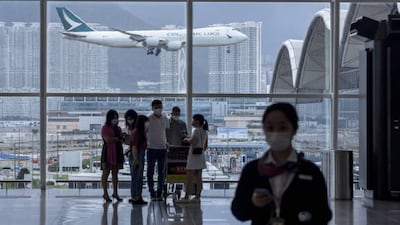Hong Kong's Cathay Pacific narrowed its first-half loss by 23 per cent as it cut costs, preserved cash and benefited from strong cargo demand, but the carrier said it continues to face the "toughest period" of its history due to challenges arising from the Covid-19 pandemic.
The group's loss reached HK$7.56 billion ($977m) for the first six months of 2021 to the end of June, compared with a HK$9.86bn loss in the same period last year, Cathay Pacific said in a statement to the Hong Kong stock exchange on Wednesday. Revenue fell about 43 per cent year-on-year to HK$15.85bn.
"Covid-19 continued to pose significant challenges for the Cathay Group in the first half of 2021 and this continues to be the toughest period in our history," Patrick Healy, chairman of Cathay Pacific, said in the statement. "The emergence of new virus variants led to the tightening of travel restrictions and quarantine requirements in Hong Kong and several of our key markets."
Global airlines are continuing to feel the impact of the Covid-19 pandemic as passenger traffic – particularly on international travel – is hampered by government-imposed restrictions to curb the more contagious Covid-19 virus variants. Cathay Pacific, which does not have a domestic market and relies on international journey, is suffering from the impact of pandemic-related border shutdowns.
Cathay Pacific carried 157,000 passengers in the first half of 2021, 96.4 per cent fewer than in the same period in 2020. It filled 18.9 per cent of its planes, compared with a seat load factor of 67.3 per cent in the first half of last year.
As a result, passenger revenue, which was severely affected by Covid-19-related travel restrictions and quarantine requirements, plunged 92.8 per cent year-on-year to HK$745m.
"We hope to operate up to 30 per cent of our pre-pandemic passenger capacity by the fourth quarter of 2021, but this is dependent on operational and passenger travel restrictions being lifted," Mr Healy said.
The airline recorded impairment and related charges of HK$500m mainly relating to 11 aircraft that are unlikely to re-enter meaningful economic service before they retire or are returned to lessors and HK$403m in restructuring costs, it said. This compares to impairment and related charges for 16 aircraft of HK$1.24bn and certain airline service subsidiaries’ assets of HK$1.22bn in the first half of 2020.
Air cargo was the main bright spot for the airline. Cargo yields rose an annual 24.4 per cent as freight demand grew. The group's cargo revenue rose 0.1 per cent to HK$12.69bn in the first half of the year, despite a lower cargo capacity as a result of fewer passenger aircraft being flown. Nearly 50 per cent of cargo is carried in the bellyhold of passenger jets.
"We expect our cargo operations to continue to perform strongly in the second half of the year," Mr Healy said.
The airline is targeting to lower its cash burn to less than HK$1bn per month for the remainder of the year, along with a focus on "prudent" cash management.
The carrier recorded a fuel hedging gain of HK$625m in the first half, compared with a HK$1.6bn loss in the same period last year.
"Fuel consumption is lower, in line with reduced aircraft flying hours," it said. "Increased fuel prices were offset by fuel hedging gains."
As of June 30, the group had 196 aircraft.
"Given current conditions, approximately 40 per cent of our passenger aircraft are parked in locations outside of Hong Kong in keeping with prudent operational and asset management considerations," it said. "This is subject to change as we continue to reassess our passenger flight capacity."
As of June 30, the airline's available unrestricted liquidity balance stood at HK$32.8bn.
"The group currently has sufficient unrestricted liquidity for at least the next 12 months," the airline said.
Shares in Cathay Pacific rose as much as 1.9 per cent after its earnings report on Wednesday. The stock has declined 12 per cent this year, the fifth-worst performer on the Bloomberg World Airline Index.
"Covid-19 will continue to have a severe impact on our business until borders progressively open and travel constraints are lifted," Mr Healy said. "As governments have stated, this is only going to be possible when sufficiently high vaccination levels are achieved. There are encouraging signs of recovery in some domestic aviation markets. However, travel restrictions and quarantine requirements continue to affect cross-border travel adversely. The progress of vaccination is encouraging, but the pace and timing of recovery remain uncertain."


